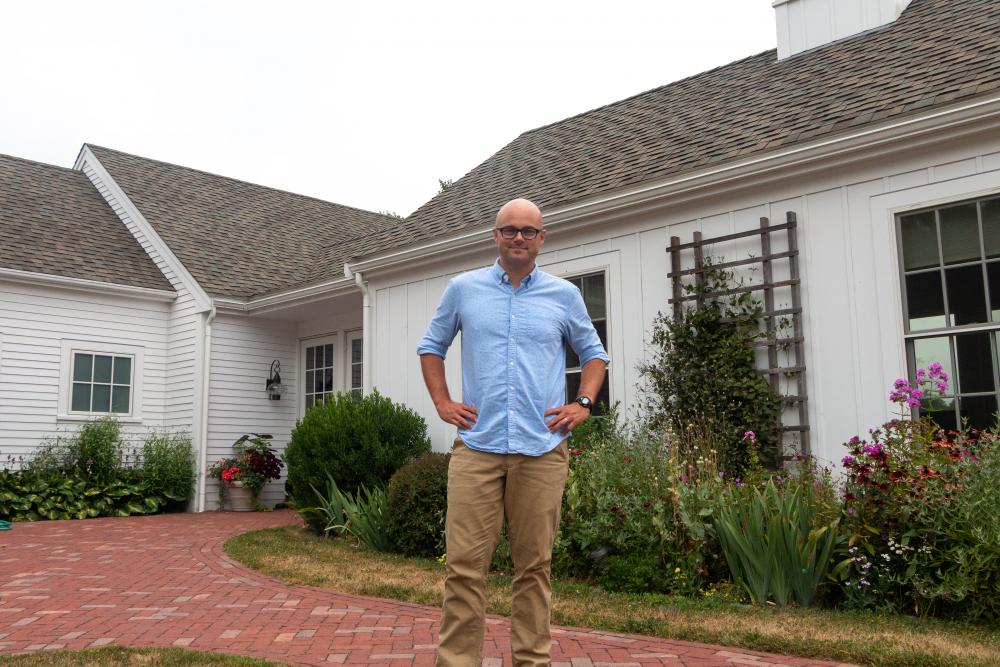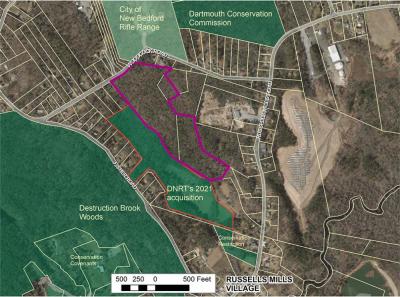Meet the new director of the Dartmouth Natural Resources Trust
It’s the circle of life.
After 18 years as executive director of the Dartmouth Natural Resources Trust, Dexter Mead is retiring from the organization this year, leaving behind a legacy of expanded preservation throughout the town.
Filling his shoes — presumably a well-worn pair of hiking boots — is the appropriately-named Nicholas Wildman, a newcomer to the organization with experience in ecological conservation and restoration.
Wildman has been a resident of New Bedford since 2006, where he lives just on the other side of the border with Dartmouth. As a result, he has been hiking DNRT properties for years with his wife and kids.
While he said he is still getting the lay of the land, he is excited to get to work building on the success of his predecessor.
“I’m still just getting my feet under me,” he said. “My number one goal is to really build on the momentum and the wonderful work that Dexter and the staff and board have done over the last 18 years that Dexter has been here.”
He added that he sees himself as “standing on the shoulders” of their work and is trying to “extract as much institutional knowledge from Dexter” as he can during the transitional period while Mead is still working with the organization.
Wildman said he was curious about the executive director position as soon as he heard that Mead was retiring.
“For me this was an opportunity to do something good, something tangible, something on the ground right here in my backyard,” he said. “So I said, this is a wonderful thing — I think I have to throw my hat in the ring and see if it’s a fit.”
Wildman is a graduate of the University of Maine at Machias where he earned a bachelor’s degree in environmental studies and did field work protecting Atlantic salmon populations.
He said it wasn’t until after he graduated that he realized he was “more of a people person than a scientist.”
When he went back to school to get his master’s degree from Duke University, Wildman studied economics and policy. While there, he focused on working with agricultural landowners to preserve certain kinds of trees that provided critical habitats for endangered species.
In his professional work with the Massachusetts Division of Ecological Restoration — part of the Department of Fish and Game — Wildman has worked in a similar capacity to restore wetlands by removing old dams whose environmental impacts have outlived their usefulness.
Wildman said his experience has helped him understand how to approach landowners who may be better motivated by public safety issues than purely ecological arguments.
“We really want to be looking at the whole picture,” he said, explaining that oftentimes property owners are happy to rid themselves of a burdensome dam or outdated culvert as long as they’re not footing the bill by themselves.
He said that by looking for public benefits that such a project can create — like climate change resilience or protecting rare species — preservationists can often secure funding from non-profits or government agencies to lessen the cost of the project for the landowner.
“Working in partnerships is really 100% of my background,” he said.
Wildman said he hopes that spirit of cooperation will help the DNRT strengthen their relationships with agricultural landowners in Dartmouth.
He said that one of the organization’s most exciting new projects was born out of just that kind of relationship.
The project, dubbed the Russells Mills Land Conservation Project Phase II, would hinge on the acquisition of a 25-acre parcel of land that lies between Russells Mills, Fisher, and Woodcock roads.
Though it may not be a jaw-dropping amount of land on its face, the parcel is significant because it would complete a “protected corridor” of conservation lands stretching from Slocum’s River to UMass Dartmouth.
“What’s great about this is that it’s the result of many years of talking with landowners in that area,” said Wildman. “When we think about climate change resilience, and we think about preserving species, and we think about landscape connectivity, that kind of opportunity is so critical.”
Wildman added that restoration work in Massachusetts, as in other parts of the country, usually requires a “scattershot” approach of protecting individual properties when the opportunities present themselves.
“People in conservation really need to take advantage of those opportunities,” he said. “When those opportunities can knit together into a larger result like this, it’s just really exciting.”














